Anonym (......) skrev 2024-06-14 16:16:39 följande:
För att vi inte är religiösa. Bättre att barnet lägger tid på något vettigt som att lära sig om riktiga saker, typ vetenskap, mattematik, språk osv.
Det ena utesluter ju inte det andra. Här är en lista på framstående naturvetenskapliga forskare och upptäckare, som samtidigt var katolska präster (från Wikipedia):
The clergy-scientists[edit]
 Nicolaus Copernicus
Nicolaus Copernicus Roger Bacon
Roger Bacon's circular diagrams relating to the scientific study of optics
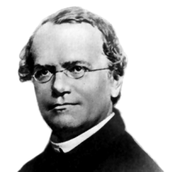 Gregor Mendel
Gregor Mendel, Augustinian friar and geneticist

Sacrobosco's
De sphaera mundi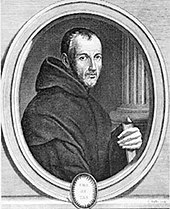 Marin Mersenne
Marin Mersenne Pierre Gassendi
Pierre Gassendi William of Ockham
William of Ockham
Illustration from
Nicolas Steno's 1667 paper comparing the teeth of a shark head with a fossil tooth
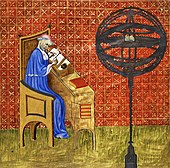 Nicole Oresme
Nicole Oresme Albertus Magnus
Albertus Magnus Christopher Clavius
Christopher Clavius
First page of Boscovich's
Theoria Philosophiæ Naturalis
Map of the Far East by
Matteo Ricci in 1602
 Nicolas of Cusa
Nicolas of Cusa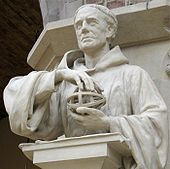
Statue of Roger Bacon in the Oxford University Museum
 Nicolas Steno
Nicolas Steno
The
machina meteorologic, invented by
Václav Prokop Divi?, worked like a lightning rod
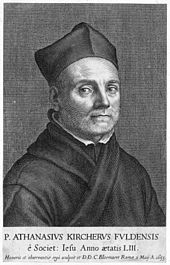 Athanasius Kircher
Athanasius Kircher Roger Boscovich
Roger Boscovich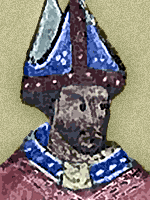 Robert Grosseteste
Robert Grosseteste Johan Stein
Johan Stein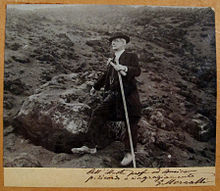 Giuseppe Mercalli
Giuseppe Mercalli Antonio Stoppani
A[edit]
José de Acosta
Antonio Stoppani
A[edit]
José de Acosta (1539?1600) ? Jesuit missionary and naturalist who wrote one of the first detailed and realistic descriptions of the new world
[5]
François d'Aguilon (1567?1617) ? Belgian Jesuit mathematician, architect, and physicist, who worked on optics
Lorenzo Albacete (1941?2014) ? priest, physicist, and theologian
Albert of Castile (c. 1460 ? 1522) ? Dominican priest and historian
Albert of Saxony (philosopher) (c. 1320 ? 1390) ? German bishop known for his contributions to logic and physics; with Buridan he helped develop the theory that was a precursor to the modern theory of inertia
[6]
Albertus Magnus (c. 1206 ? 1280) ? Dominican friar and Bishop of Regensburg who has been described as "one of the most famous precursors of modern science in the High Middle Ages."
[7] Patron saint of natural sciences; Works in physics, logic, metaphysics, biology, and psychology.
Giulio Alenio (1582?1649) ? Jesuit
theologian,
astronomer and
mathematician; was sent to the Far East as a
missionary and adopted a
Chinese name and customs; wrote 25 books, including a cosmography and a
Life of Jesus in
Chinese.
José María Algué (1856?1930) ? priest and meteorologist who invented the barocyclonometer
[8]
José Antonio de Alzate y Ramírez (1737?1799) ? priest, scientist, historian, cartographer, and meteorologist who wrote more than thirty treatises on a variety of scientific subjects
Bartholomeus Amicus (1562?1649) ? Jesuit who wrote about include Aristotelian philosophy, mathematics, astronomy, and the concept of vacuum and its relationship with God
Stefano degli Angeli (1623?1697) ?
Jesuate (not to be confused with Jesuit), philosopher and mathematician, known for his work on the precursors of infinitesimal calculus
Pierre Ango (1640?1694) ? Jesuit scientist who published a book on optics
Francesco Castracane degli Antelminelli (1817?1899) ? priest and botanist who was one of the first to introduce microphotography into the study of biology
[9]
Giovanni Antonelli (1818?1872) ? priest and astronomer who served as director of the
Ximenian Observatory of Florence
Nicolò Arrighetti (1709?1767) ? Jesuit who wrote treatises on light, heat, and electricity
Mariano Artigas (1938?2006) ? Spanish physicist, philosopher and theologian
Giuseppe Asclepi (1706?1776) ? Jesuit astronomer and physician who served as director of the Collegio Romano observatory; the lunar crater Asclepi is named after him
Nicanor Austriaco ? Dominican microbiologist, associate professor of biology and professor of theology at Providence College as well as chief researcher at the Austriaco Laboratory
B[edit]
Roger Bacon (c. 1214 ? 1294) ? Franciscan friar who made significant contributions to mathematics and optics and has been described as a forerunner of modern
scientific method[10]
Bernardino Baldi (1533?1617) ? abbot, mathematician, and writer
Eugenio Barsanti (1821?1864) ? Piarist, possible inventor of the internal combustion engine
[11]
Daniello Bartoli (1608?1685) ? Bartoli and fellow Jesuit astronomer Niccolò Zucchi are credited as probably having been the first to see the equatorial belts on the planet Jupiter
[12][13]
Joseph Bayma (1816?1892) ? Jesuit known for work in stereochemistry and mathematics
Giovanni Battista Beccaria (1716?1781) ?
Piarist, physicist, teacher of
Joseph-Louis Lagrange,
Luigi Galvani and
Alessandro Volta, correspondent of
Benjamin Franklin
Giacopo Belgrado (1704?1789) ? Jesuit professor of mathematics and physics and court mathematician who did experimental work in electricity
Michel Benoist (1715?1774) ? missionary to China and scientist
Mario Bettinus (1582?1657) ? Jesuit philosopher, mathematician and astronomer; lunar crater Bettinus named after him
Giuseppe Biancani (1566?1624) ? Jesuit astronomer, mathematician, and selenographer, after whom the crater Blancanus on the Moon is named
Jacques de Billy (1602?1679) ? Jesuit who has produced a number of results in number theory which have been named after him; published several astronomical tables; the crater Billy on the Moon is named after him
Paolo Boccone (1633?1704) ? Cistercian botanist who contributed to the fields of medicine and toxicology
Bernard Bolzano (1781?1848) ? priest, mathematician, and logician whose other interests included metaphysics, ideas, sensation, and truth
Anselmus de Boodt (1550?1632) ? canon who was one of the founders of mineralogy
Theodoric Borgognoni (1205?1298) ? Dominican friar, Bishop of Cervia, and medieval Surgeon who made important contributions to antiseptic practice and anaesthetics
Thomas Borgmeier (1892?1975) ? German-born priest and entomologist who worked in Brazil
Christopher Borrus (1583?1632) ? Jesuit mathematician and astronomer who made observations on the magnetic variation of the compass
Roger Joseph Boscovich (1711?1787) ? Jesuit polymath known for his contributions to modern atomic theory and astronomy and for devising perhaps the first geometric procedure for determining the equator of a rotating planet from three observations of a surface feature and for computing the orbit of a planet from three observations of its position
[14]
Joachim Bouvet (1656?1730) ? Jesuit sinologist and cartographer who did his work in China
Micha? Boym (c. 1612 ? 1659) ? Jesuit who was one of the first westerners to travel within the Chinese mainland, and the author of numerous works on Asian fauna, flora and geography
Thomas Bradwardine (c. 1290 ? 1349) ? Archbishop of Canterbury and mathematician who helped develop the mean speed theorem; one of the Oxford Calculators
Martin Stanislaus Brennan (1845?1927) ? priest and astronomer who wrote several books about science
Henri Breuil (1877?1961) ? priest, archaeologist, anthropologist, ethnologist and geologist
Jan Bro?ek (1585?1652) ? Polish canon, polymath, mathematician, astronomer, and physician; the most prominent Polish mathematician of the 17th century
Pádraig de Brún (1889?1960) ? Irish priest, mathematician, poet, and classical scholar; served as Professor of Mathematics at
St. Patrick's College, Maynooth, President of
University College Galway, and Chairman of the Council of the
Dublin Institute for Advanced Studies
Louis-Ovide Brunet (1826?1876) ? priest, one of the founding fathers of Canadian botany
Ismaël Bullialdus (1605?1694) ? priest, astronomer, and member of the Royal Society; the Bullialdus crater is named in his honor
Jean Buridan (c. 1300 ? after 1358) ? priest who formulated early ideas of momentum and inertial motion and sowed the seeds of the Copernican revolution in Europe
Tom Burke (1923?2008) ? Irish Carmelite priest, physicist and school teacher, and co-founder of the
Young Scientist and Technology Exhibition
Roberto Busa (1913?2011) ? Jesuit, wrote a
lemmatization of the complete works of
St. Thomas Aquinas (
Index Thomisticus) which was later digitalized by
IBM
C[edit]
Niccolò Cabeo (1586?1650) ? Jesuit mathematician; the crater Cabeus is named in his honor
Nicholas Callan (1799?1846) ? priest and Irish scientist best known for his work on the induction coil
Luca de Samuele Cagnazzi (1764?1852) ? archdeacon, mathematician, political economist and inventor of the
tonograph
John Cantius (1390?1473) ? priest and
Buridanist mathematical physicist who further developed the
theory of impetus
Jean Baptiste Carnoy (1836?1899) ? priest, has been called the founder of the science of cytology
[15]
Giovanni di Casali (died c. 1375) ? Franciscan friar who provided a graphical analysis of the motion of accelerated bodies
Paolo Casati (1617?1707) ? Jesuit mathematician who wrote on astronomy, meteorology, and vacuums; the crater Casatus on the Moon is named after him; published
Terra machinis mota (1658), a dialogue between Galileo, Paul Guldin and father Marin Mersenne on cosmology, geography, astronomy and geodesy, giving a positive image of Galileo 25 years after his conviction.
Giovanni Caselli (1815?1891) ? priest who developed the
pantelegraph, a forerunner of the
fax machine
Laurent Cassegrain (1629?1693) ? priest who was the probable namesake of the Cassegrain telescope; the crater Cassegrain on the Moon is named after him
Louis Bertrand Castel (1688?1757) ? French Jesuit physicist who worked on gravity and optics in a Cartesian context
Benedetto Castelli (1578?1643) ? Benedictine mathematician; long-time friend and supporter of Galileo Galilei, who was his teacher; wrote an important work on fluids in motion
Bonaventura Cavalieri (1598?1647) ?
Jesuate (not to be confused with Jesuit) known for his work on the problems of optics and motion, work on the precursors of infinitesimal calculus, and the introduction of logarithms to Italy; his principle in geometry partially anticipated integral calculus; the lunar crater Cavalerius is named in his honor
Antonio José Cavanilles (1745?1804) ? priest and leading Spanish taxonomic botanist of the 18th century
Francesco Cetti (1726?1778) ? Jesuit zoologist and mathematician
Tommaso Ceva (1648?1737) ? Jesuit mathematician, poet, and professor who wrote treatises on geometry, gravity, and arithmetic
Christopher Clavius (1538?1612) ? German mathematician and astronomer, most noted in connection with the
Gregorian calendar, his arithmetic books were used by many mathematicians including Leibniz and Descartes
Gaston-Laurent Coeurdoux (1691?1779) ? Jesuit ethnologist and philologer who composed the first treatise of Indology.
Guy Consolmagno (1952?) ? Jesuit astronomer and planetary scientist, serving as Director of the
Vatican Observatory
Nicolaus Copernicus (1473?1543) ? Renaissance astronomer and canon famous for his heliocentric cosmology that set in motion the Copernican Revolution
Vincenzo Coronelli (1650?1718) ? Franciscan cosmographer, cartographer, encyclopedist, and globe-maker
Bonaventura Corti (1729?1813) ? Italian biologist and physicist who made microscopic observations on Tremels, rotifers and seaweeds
George Coyne (1933?2020) ? Jesuit astronomer and former director of the Vatican Observatory whose research interests have been in polarimetric studies of various subjects, including
Seyfert galaxies
James Cullen (mathematician) (1867?1933) ? Jesuit mathematician who published what is now known as Cullen numbers in number theory
James Curley (astronomer) (1796?1889) ? Jesuit, first director of Georgetown Observatory and determined the latitude and longitude of Washington, D.C.
Albert Curtz (1600?1671) ? Jesuit astronomer who expanded on the works of Tycho Brahe and contributed to early understanding of the moon; the crater Curtius on the Moon is named after him
Johann Baptist Cysat (1587?1657) ? Jesuit mathematician and astronomer, after whom the lunar crater Cysatus is named; published the first printed European book concerning Japan; one of the first to make use of the newly developed telescope; did important research on comets and the
Orion nebula
Jean-Baptiste Chappe d'Auteroche (1722?1769) ? priest and astronomer best known for his observations of the transits of Venus
D[edit]
Ignazio Danti (1536?1586) ? Dominican mathematician, astronomer, cosmographer, and cartographer
Armand David (1826?1900) ? Lazarist priest, zoologist, and botanist who did important work in these fields in China
Francesco Denza (1834?1894) ? Barnabite meteorologist, astronomer, and director of Vatican Observatory
Václav Prokop Divi? (1698?1765) ? Czech priest who studied electrical phenomenons and constructed, among other inventions, the first electrified musical instrument in history
Johann Dzierzon (1811?1906) ? priest and pioneering apiarist who discovered the phenomenon of parthenogenesis among bees, and designed the first successful movable-frame beehive; has been described as the "father of modern apiculture"
F[edit]
Francesco Faà di Bruno (c. 1825?1888) ? priest and mathematician beatified by Pope John Paul II
Honoré Fabri (1607?1688) ? Jesuit mathematician and physicist
Jean-Charles de la Faille (1597?1652) ? Jesuit mathematician who determined the center of gravity of the sector of a circle for the first time
Gabriele Falloppio (1523?1562) ? canon and one of the most important anatomists and physicians of the sixteenth century; the fallopian tubes, which extend from the uterus to the ovaries, are named for him
Gyula Fényi (1845?1927) ? Jesuit astronomer and director of the Haynald Observatory; noted for his observations of the sun; the crater Fényi on the Moon is named after him
Louis Feuillée (1660?1732) ? Minim explorer, astronomer, geographer, and botanist
Kevin T. FitzGerald (1955?) ? American molecular biologist and holds the Dr. David Lauler chair in Catholic Health Care Ethics at
Georgetown University
Placidus Fixlmillner (1721?1791) ? Benedictine priest and one of the first astronomers to compute the orbit of Uranus
Paolo Frisi (1728?1784) ? priest, mathematician, and astronomer who did significant work in hydraulics
Paolo Antonio Foscarini (c. 1565?1616) ? Carmelite father and scientist who wrote about liberal arts, mathematics, physics, and metaphysics
José Gabriel Funes (1963?) ? Jesuit astronomer and former director of the Vatican Observatory
Lorenzo Fazzini [it] (1787?1837) ? priest and physicist born in Vieste and working in Naples
G[edit]
Joseph Galien (1699 ? c. 1762) ? Dominican professor who wrote on aeronautics, hailstorms, and airships
Jean Gallois (1632?1707) ? French scholar, abbot, and member of Académie des Sciences
Leonardo Garzoni (1543?1592) ? Jesuit natural philosopher; author of the first known example of a modern treatment of magnetic phenomena
Pierre Gassendi (1592?1655) ? French priest, astronomer, and mathematician who published the first data on the transit of Mercury; best known intellectual project attempted to reconcile Epicurean atomism with Christianity
Antoine Gaubil (1689?1759) ? French astronomer who was the director general of the College of Interpreters at the court of China between 1741 and 1759 and centralized information provided by the Jesuit observatories throughout the world
Agostino Gemelli (1878?1959) ? Franciscan physician and psychologist; founded Catholic University of the Sacred Heart in Milan
Niccolò Gianpriamo (1686?1759) ? Italian Jesuit, missionary and astronomer
Giuseppe Maria Giovene (1753?1837) ? Italian archpriest, naturalist, meteorologist, agronomist and entomologist
Johannes von Gmunden (c. 1380 ? 1442) ? canon, mathematician, and astronomer who compiled astronomical tables; Asteroid 15955 Johannesgmunden named in his honor
Carlos de Sigüenza y Góngora (1645?1700) ? priest, polymath, mathematician, astronomer, and cartographer; drew the first map of all of New Spain
Gilles-François de Gottignies (1630?1689) ? Belgian Jesuit mathematician and astronomer.
Andrew Gordon (1712?1751) ? Benedictine monk, priest, physicist, and inventor who made the first electric motor
Guido Grandi (1671-1742) - Italian monk, priest, philosopher, theologian, mathematician, and engineer
Giovanni Antonio Grassi (1775?1849) ? Jesuit astronomer who calculated the longitude of Washington, D.C.
Orazio Grassi (1583?1654) ? Jesuit mathematician, astronomer and architect; engaged in controversy with Galileo on the subject of comets
Christoph Grienberger (1561?1636) ? Jesuit astronomer after whom the crater Gruemberger on the Moon is named; verified Galileo's discovery of Jupiter's moons
Francesco Maria Grimaldi (1618?1663) ? Jesuit who discovered the diffraction of light (indeed coined the term "diffraction"), investigated the free fall of objects, and built and used instruments to measure geological features on the moon
Robert Grosseteste (c. 1175 ? 1253) ? bishop who was one of the most knowledgeable men of the Middle Ages; has been called "the first man ever to write down a complete set of steps for performing a scientific experiment"
[16]
Johann Grueber (1623?1680) ? Jesuit missionary and astronomer in China
Paul Guldin (1577?1643) ? Jesuit mathematician and astronomer who discovered the Guldinus theorem to determine the surface and the volume of a solid of revolution
Bartolomeu de Gusmão (1685?1724) ? Jesuit known for his early work on lighter-than-air airship design
H[edit]
Johann Georg Hagen (1847?1930) ? Jesuit director of the Georgetown and Vatican Observatories; the crater Hagen on the Moon is named after him
Frank Haig (1928?2024) ? American physics professor
Nicholas Halma (1755?1828) ? French abbot, mathematician, and translator
Jean-Baptiste du Hamel (1624?1706) ? French priest, natural philosopher, and secretary of the Academie Royale des Sciences
René Just Haüy (1743?1822) ? priest known as the father of
crystallography
Maximilian Hell (1720?1792) ? Jesuit astronomer and director of the Vienna Observatory who wrote astronomy tables and observed the
Transit of Venus; the crater Hell on the Moon is named after him
Micha? Heller (1936?) ? Polish priest, Templeton Prize winner, and prolific writer on numerous scientific topics
Lorenz Hengler (1806?1858) ? priest often credited as the inventor of the horizontal pendulum
Hermann of Reichenau (1013?1054) ? Benedictine historian, music theorist, astronomer, and mathematician
Lorenzo Hervás y Panduro (1735?1809) ? Jesuit philologer and discoverer of the Austronesian language family.
Pierre Marie Heude (1836?1902) ? Jesuit missionary and zoologist who studied the natural history of Eastern Asia
Franz von Paula Hladnik (1773?1844) ? priest and botanist who discovered several new kinds of plants, and certain genera have been named after him
Giovanni Battista Hodierna (1597?1660) ? priest and astronomer who catalogued nebulous objects and developed an early microscope
Johann Baptiste Horvath (1732?1799) ? Hungarian physicist who taught physics and philosophy at the University of Tyrnau, later of Buda, and wrote many Newtonian textbooks
Victor-Alphonse Huard (1853?1929) ? priest, naturalist, educator, writer, and promoter of the natural sciences
I[edit]
Maximus von Imhof (1758?1817) ? German Augustinian physicist and director of the Munich Academy of Sciences
Giovanni Inghirami (1779?1851) ? Italian Piarist astronomer who has a valley on the moon named after him as well as a crater
J[






















